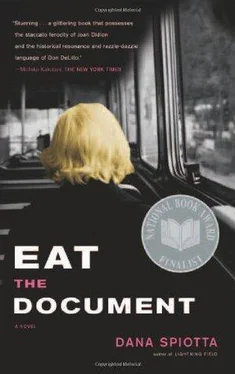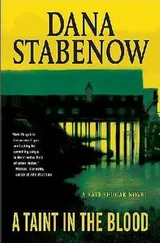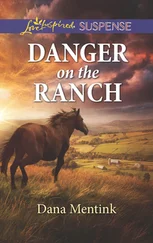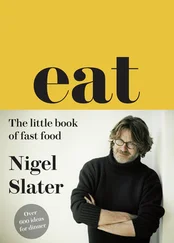Dana Spiotta - Eat the Document
Здесь есть возможность читать онлайн «Dana Spiotta - Eat the Document» весь текст электронной книги совершенно бесплатно (целиком полную версию без сокращений). В некоторых случаях можно слушать аудио, скачать через торрент в формате fb2 и присутствует краткое содержание. Год выпуска: 2006, Издательство: Scribner, Жанр: Современная проза, на английском языке. Описание произведения, (предисловие) а так же отзывы посетителей доступны на портале библиотеки ЛибКат.
- Название:Eat the Document
- Автор:
- Издательство:Scribner
- Жанр:
- Год:2006
- ISBN:нет данных
- Рейтинг книги:3 / 5. Голосов: 1
-
Избранное:Добавить в избранное
- Отзывы:
-
Ваша оценка:
- 60
- 1
- 2
- 3
- 4
- 5
Eat the Document: краткое содержание, описание и аннотация
Предлагаем к чтению аннотацию, описание, краткое содержание или предисловие (зависит от того, что написал сам автор книги «Eat the Document»). Если вы не нашли необходимую информацию о книге — напишите в комментариях, мы постараемся отыскать её.
shifts between the underground movement of the 1970s and the echoes and consequences of that movement in the 1990s. A National Book Award finalist,
is a riveting portrait of two eras and one of the most provocative and compelling novels of recent years.
Eat the Document — читать онлайн бесплатно полную книгу (весь текст) целиком
Ниже представлен текст книги, разбитый по страницам. Система сохранения места последней прочитанной страницы, позволяет с удобством читать онлайн бесплатно книгу «Eat the Document», без необходимости каждый раз заново искать на чём Вы остановились. Поставьте закладку, и сможете в любой момент перейти на страницу, на которой закончили чтение.
Интервал:
Закладка:
“The best kind of hijack is to create an alternate site that looks and behaves just like the real site. I call these parasites. But the links are altered, the information is rearranged so that the truth can be disseminated, but also so misinformation can be posted about where they are meeting and other logistics, as well as some irreverent information just to ridicule them and underline their hypocrisy.”
“How long do you get away with it?” Nash asked.
“If you do it gradually, and don’t shoot your wad all at once, you can string them along for weeks. Monsanto took two weeks to notice. People look at their sites but don’t really ‘read’ the rest of it. And if you imitate their language, and their design, you can often tamper extensively and extendedly.”
“But ultimately detected.”
“Oh sure. Especially if you are giving out false information about meetings and such. It is admittedly a limited gesture, but you can really humiliate these corporate site designers. And these organizations.”
Who would have guessed, Josh? That was how it should be done, she thought. Look and seem straight and law-abiding but actually do things to subvert the status quo. Do something genuinely subversive.
When the meeting ended, Josh walked over to her and asked what she’d been up to since graduation. She invited him down the street to check out the Black House. She didn’t think twice about it — Josh was the kind of guy she generally didn’t get any attention from. She liked listening to him. And she really liked leaving with him.
After everyone left, Nash sat for a while. He didn’t feel like cleaning up the flyers and coffee cups by himself. Even Henry wasn’t around to distract him. Instead Nash lay down on one of the benches and listened to Mingus Ah Um .
It was okay, really, because Josh was her age and that was the way it should be. And Josh was smarter than he thought. Any nagging feelings of doubt, any issues he had with Josh’s character or intentions were not based on anything articulable or objective. He knew his bad feelings came from a little jealousy. The truth was, Nash also felt relieved. He didn’t even mind, too much, when she stopped coming in altogether. He knew that time would make all his twinges fade and eventually go. He knew this because he’d had to let go of things before, as everyone did. It was sad to admit it, but forgetting was a slow, gradual liberation. But knowing this about himself also proved that at some level you don’t completely forget the things you endure. They just fade until it almost seems as though they happened to someone else.
He would get used to not seeing her in the store. And later, when he saw them walking together on the street, he reassured himself that it was a good thing for her, and maybe it really was.
Without Mouths
SOME DAYS Henry thought exclusively of the evening to come. He would walk around the city, doing his upkeep on his buildings, blinking in the sun, and he would tremble with dread.
He could manage, most days, to redirect and distract. Five weeks went by, and he got nothing. They have finally left for good, he thought, then stopped, retracted that. He had become fervent in his superstitions. Every thought, every move seemed to require a countergesture just in case.
He lay on his bed and nothing came. He rigorously avoided dark thoughts. He watched television. He dropped into sleep, or at least a tossed, soporific stupor, and then he woke with a start to an extra-loud infomercial, his shoulders mangled into the couch, his throat parched.
He felt fear at a distance first, and then more intensely as it had a gaming, even playful approach. Don’t look at the clock. Just turn off the set and go back to sleep.
But as he got up off the couch, he glanced at the wall clock: 3:00 a.m. He couldn’t find the remote, so he pushed the power button directly on the television. The room abruptly went silent. He felt a creep of adrenaline as he listened into the night. He tried to laugh it off — just don’t start listening for things.
He felt his heart beating faster. He felt the silence of the house overcome by a multitude of tiny midnight sounds, just like how the dark outside will fade as your eyes get used to it until gradually you can see the thousand stars, the trees, and the moon shadows on the ground. He heard the hum of his refrigerator kick in. He heard the rain tack against windowpanes and roof. He heard the furnace die down.
He woke again with another start at dawn. He felt relief: not only could he not remember any dream of any color but there was the blessed weak sun and all the glorious diffused light of a Northwest sunrise. He lay back on his pillow feeling at a great distance from all his worried ruminations during the night. Then, gradually, almost imperceptibly, he felt an odd breeze — a tropical, slow heat blow languidly across his face.
Shit.
Henry is in a narrow street. He smells nothing of the palm trees he passes, nothing of the hot pavement he walks on. He smells instead a monolithic bludgeon of a smell: an oily-yet-astringent, froggy formaldehyde smell. He turns in to a doorway. It is the Saigon hospital. But it is Ho Chi Minh City now, and he is there for a reason.
He walks down a corridor to a special division. It is quiet. He pushes open a swinging door, and he steps inside.
The smell of formaldehyde is acute now; he puts his hand to his face to no avail. He sees, in shadows at first, then more clearly, rows of large glass containers. There must be two hundred of them. Then his eyes adjust. He sees the forms suspended in fluid. Flimsy, fetal, tiny beings. The doubled forms with one body half-grown into the other. Faces without mouths. Limbs without digits. Mono-eyed stares. The formaldehyde smell continues, and the bodies have a translucent cast in the bottles. There is no constant among these catastrophes except why they are here, in these jars, and what they signify.
When Henry stopped he wasn’t puking, or even crying. He stared at the sunlight in the room. What can sunlight do for me? He knew, if not today, or in a month, he would again smell that viscous formaldehyde in his nose and throat, right in the light of day.
What else frightens Henry:
Chloropicrin gas smells of apple blossoms.
Hydrogen cyanide agent smells of toasted almonds.
and
Asphyxiants, vesicants, lacrimants.
and
The things that must be answered for are without end.
I’m with the Bandwidth
“JUST MAKE yourself at home.” They had been together for a few weeks, but things moved slowly. This was the first time Miranda had been invited to his house (actually his parents’ house). Josh went straight to his computers. He owned two gleaming flat-screen monitors with protoplasmic, translucent gray-blue casings and sleek, silent keyboards, ergonomically contoured in the middle. He had no mess, no clutter. No loose papers.
“I like keyboards that click,” she said. He looked at the screen. He seldom touched the mouse but used everything on programmed key command.
“I don’t like squishy keyboards,” she continued. He checked his e-mail. It looked like he had about two hundred messages. He opened one from the list and scanned it quickly. It was strange that Josh lived in suburban splendor in Bellevue. He stayed a couple of nights with her in the city, sleeping over but still not having sex (not completely anyway, which was somehow mutually acceptable to both of them though they didn’t speak of it). She didn’t mind that he didn’t stay much past dawn. Or that he preferred his room at his parents’ house.
“Let me just reply to this. Give me a minute.”
Читать дальшеИнтервал:
Закладка:
Похожие книги на «Eat the Document»
Представляем Вашему вниманию похожие книги на «Eat the Document» списком для выбора. Мы отобрали схожую по названию и смыслу литературу в надежде предоставить читателям больше вариантов отыскать новые, интересные, ещё непрочитанные произведения.
Обсуждение, отзывы о книге «Eat the Document» и просто собственные мнения читателей. Оставьте ваши комментарии, напишите, что Вы думаете о произведении, его смысле или главных героях. Укажите что конкретно понравилось, а что нет, и почему Вы так считаете.












